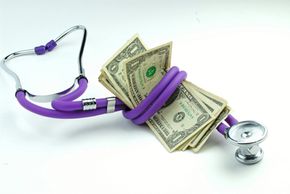
A flexible spending account (FSA) is a tax-advantaged financial account into which you can automatically deposit a portion of your pretax paycheck. You can use the money in the account to pay for qualified medical expenses not covered by insurance, like dental and optometrist visits, certain "FSA-approved" over-the-counter medications and supplies for chronic conditions. FSAs can be beneficial to you and your employer -- the company can save money on payroll and tout an FSA as a great benefit, and you both can save on social security taxes. Plus, if you use it correctly, an FSA can help to offset your out-of-pocket medical expenses and pay for your monthly health insurance premiums. You can even use different types of FSAs to pay for your day-to-day expenses of caring for a dependent, or to cover adoption expenses.
Let's dig a little deeper and explore the ins and the outs, along with the pros and cons, of an FSA. There are a few kinds of FSAs available, but we're going to focus on medical FSAs.
Advertisement
The Ins and Outs of Flexible Spending Accounts
Once you decide to take advantage of an FSA, you need to determine an annual allotment. You can figure out the amount by totaling the health care expenses you think you'll have that year. Think about your expenses from last year and any upcoming medical procedures not covered by insurance, like LASIK eye surgery. Once you have the total, divide it by the number of pay periods remaining in the year, and the money will be automatically transferred from your pretax paycheck into an FSA.
For example, if you plan to contribute $2,000 at the beginning of the year and you get paid 26 times a year, $76.92 would automatically be deducted from each paycheck and added to your FSA. You can't change the amount once you've decided, but exceptions can be made for events like the birth of a child or the death of a spouse. You can take out money whenever you need it to cover qualified expenses.
You can use a debit card, also known as the Flexcard, to withdraw money directly from your FSA. This system also has the added benefit of automating the IRS approval process for FSAs, which, pre-Flexcard, required a good bit of paperwork and people to process it. But just because you made a qualified purchase on a Flexcard doesn't always mean you can ignore the paperwork. You'll have to prove or pay all transactions on an FSA debit card. So, because the automatic approval process still doesn't work everywhere, you could still find yourself supplying the IRS with the proper documentation from doctors, medical-equipment providers and pharmacists.
Next, we'll learn about a few more pros -- and one big con -- of the FSA.
Advertisement



